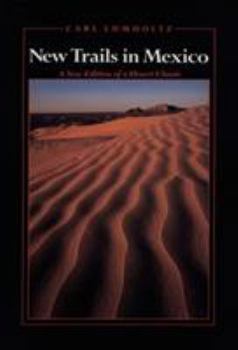New Trails in Mexico: An Account of One Year's Exploration in North-Western Sonora, Mexico, and South-Western Arizona, 190
Select Format
Select Condition 
Book Overview
This work has been selected by scholars as being culturally important and is part of the knowledge base of civilization as we know it.This work is in the public domain in the United States of America,... This description may be from another edition of this product.
Format:Paperback
Language:English
ISBN:0816511756
ISBN13:9780816511754
Release Date:April 1990
Publisher:University of Arizona Press
Length:411 Pages
Weight:1.76 lbs.
Dimensions:1.3" x 6.1" x 9.0"
Customer Reviews
1 rating
Travels in the American Desert
Published by Thriftbooks.com User , 14 years ago
100 years ago Carl Lumholtz took an extended trip through the region that is today the border areas of the states of Sonora, California, Arizona, and Baja California. Since his purpose was geographic and anthropologic exploration, he kept a journal, which this present volume is based on. One can open it to almost any one of its 365 pages and be transported back to a peaceful time when there were no highways or plastic debris or planes roaring overhead. Lumholtz goes on foot or on the back of a mule, usually accompanied and assisted by 2 or 3 Papagos, the tribe which now goes by the name Tohono O'odham. He pays them, both for their services and also for articles of their culture, which he avidly collects: blankets, baskets, masks, pots. I've never found a better book for reading at bedtime. It's the next best thing to actually reclining on the sandy ground next to the campfire and listening to Carl, a Norwegian scholar with several university degrees and many years experience with aboriginal peoples such as the Tarahumaras and Huicholes review the day's activities and discuss the evening meal: "...no meat can compare in flavor with that of the mountain sheep, even if the animal be old. Also the Indian possesses the secret of boiling meat slowly, and the frijoles (beans) served were for the same reason excellent without the adding of any lard; few people know what a delicate, natural flavor beans have. Until I had been among Indians I did not know this, and only extreme hunger would now induce me to eat the tasteless horror of so-called Boston baked beans." One morning, after being bitten by some kind of insect during the night, he notes: "With the exception of scorpions, there are not many obnoxious creatures in the region. Rattlesnakes, of course, there are, but they should not be classed with the rest, because they always give warning of their presence, besides being perhaps the only snakes known to be good-tempered. According to the Indians, few horses and cattle are bitten. ..Children in the West have been known to lift them up unharmed, and the extraordinary performance of the Hopi Indians carrying them alive in their mouths may be called to mind". He so approaches everything in his travels, with the curiosity of a child and the analytical skills of a veteran scholar. There is none of the superior attitude of the wilderness explorers of Hollywood, nor the patronizing language of European and American colonists. He shows, rather, through his language and actions that he considers people from all cultures to be worthy of respect, years before such an attitude became widely accepted. It's interesting to compare his point of view with that of Theodore Roosevelt, who took his trip through the wilds of the Brazilian jungle at about the same time. While both are diligent recorders of natural and cultural details, Rooselvelt is clearly obsessed with taming and dominating and harnessing the wilderness into the service of industrial civilization,





